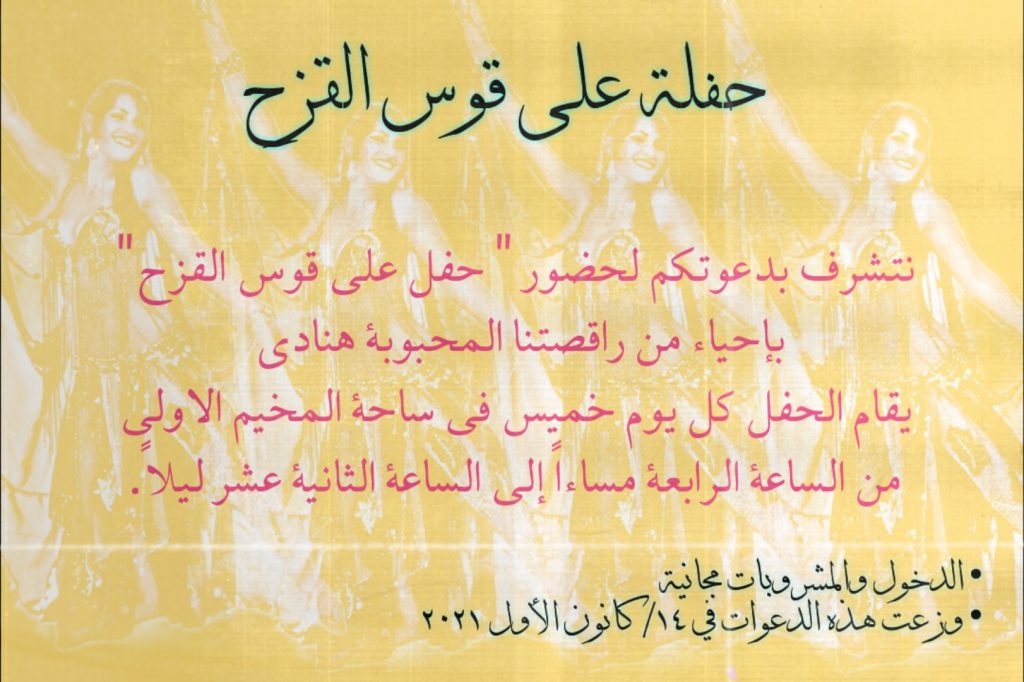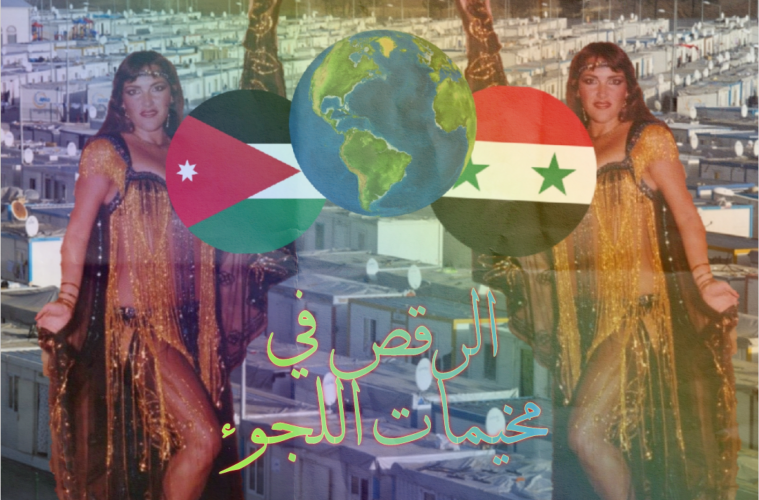Article by Mohamed Nasrallah
Translations by Hiba Moustafa
Design by Lina A., using original invitation distributed in the camp as source.
This article is part of the “Ya Leil Ya Eyein” issue
Once a month on mail delivery day, asylum seekers in a refugee camp in the Netherlands organize a secret monthly dance party.
I met with three attendees to hear their perspectives on the queer event and learn about the role of dance in the lives and psychological health of asymlum seekers, particularly in the camp. Mohannad and Tym are Syrian asylum seekers, and Emad is a Jordian asylum seeker. Through these conversations, this article shares their experiences and perspectives, and presents a different frames in which belly dance and its significance are understood between East and West, straight and queer spaces, and inside and outside the camp.
Mohannad
Would you tell us about yourself? What is your relationship with dance, and what does it represent for you?
I’m Mohannad or you may call me Hanady. I’m twenty-five, and I came to the Netherlands two years ago to seek asylum. From the moment I arrived here, I started looking for queer community circles, and luckily, I met a lot of people who shared my interests, sexual orientations and sexual identity. Here in the camp (asylum seekers’ center), we do a number of activities together, especially recreational ones. The most important of these is dance. Dance and belly dance have been among the most important self-care activities since I was in Syria; I used to dance with friends in secret or in private queer parties. Were it not for dancing I would’ve burst. This is why I and the Arabic-speaking queers in the camp have organized a weekly event where we celebrate and dance in a small hall to the tunes of European and Eastern songs, like Nancy and Haifa‘s.
So, you don’t like to dance alone?
No, I don’t. For me, dance is a collective activity and forms a strong bond between me and other people. Also, there’s a kind of light-hearted competition and teasing when we dance. Who dances better, with lighter movements… Who is more seductive… stuff like that. At the same time, dance breaks down barriers between us and we get to know each other better. It is easier for a queer person who is new to the camp to know us once they come to one of our parties.
Where do you dance apart from private parties? Do you love dancing in nightclubs?
There is no way I will belly dance or dance loosely and freely in a nightclub unless it’s for straight people. If I did belly dance in a gay club, it would be bad for my reputation and I would be shamed as ‘feminine.’ This actually happened with one of my friends, and he has been called ‘Fifi’ ever since. So, I dance in private parties or in straight clubs.
Does that mean you are more comfortable around straight people?
No, it’s not like that. In Syria, we acted femininely in gay parties, doing whatever we wanted, but we feared to do anything that could betray we were gay in straight clubs. There, gay parties were secret and we blew off steam and had the time of our lives. But in Europe, gay parties have a different meaning: they are for hooking up, boasting one’s masculinity and roughness, and flexing.
How are dance parties in the camp?
They are fun and light. They’re a chance for letting the steam off and breaking the ice, especially with new people. For me, they are also a means to get to know each other better; dance breaks barriers and brings us closer. But it’s not all fun and games; we have to be careful so that the rest of the camp residents don’t know what is going on. If they did, they would call us khawalat and bully us. Dance is a reflection of sexuality, for many people (and especially males), and people will judge us based on the way we dance. But who cares!
Would you dance for anyone?
Yeh, I did it before. I used to dance for my sexual partners before we had sex, but that was when I was a teenager and my sexual experiences were with people who loved me because I was a soft, feminine boy. I used to dance for them as a kind of foreplay and to add ‘spice’ to sex. But now, it’s different because I’m no longer a young teenager and look more masculne; I pretend to be tough to attract young men.
How did you learn to dance and who is your favorite dancer?
I taught myself at a young age. My favorite dancer is Dina; I adore her movements and facial expressions as she dances.

Tym
Can you introduce yourself?
I’m thirty years old and an asylum seeker in the Netherlands. Mohannad and I are roommates. You may say I’m like Hanady’s daughter; Hanady is my godmother and mentor, particularly in gay life here. When I first arrived, I was anxious and kept to myself. But when I met people in the camp from the LGBT community, I became more open and outgoing. Mohannad took me to a place here in the camp called LGBT Café, where we met on a weekly basis and had a change of scenery.
How do you like to dance, on your own or in a group?
Dancing alone is a lot of fun, but dancing in a group has a special flavor, particularly that I’m still new to the queer atmosphere. I’m also not used to being outgoing around people who are like me and have similar interests.
What about nightclub parties, do you like to dance there?
Coronavirus was just beginning when I arrived, so I didn’t go to concerts or parties. I did go to posh parties in Lebanon and had a lot of fun. I was the butterfly of the night; everyone loved to dance with me. But it was bothersome that all of this attention was brotherly; people approached me as a sister and not because they liked me. My friends who didn’t do belly dance and pretended to be masculine were luckier and had many admirers.
Does it matter to you if you danced around straight or queer people?
Since I left Syria, I don’t care what people think. I mean, does it really matter what people think if one loses their home country?
What do you think of dance parties in the camp?
They are alright, but I don’t like them. I go there because they are the most entertaining thing at the moment. Also, it makes me uncomfortable that organizers and the camp’s management attend these parties. Maybe I’m a little sensitive but I see pity in their eyes. It’s as if they were thinking, Dance, babies. Dance, you poor oppressed people. I think parties should be only for those who are partying, without employees who watch over us as if we were at an orphanage.
Would you dance for anyone?
No way! Why would I dance for anyone? Am I their slave girl! There is nothing wrong with dancing but I would feel weird if someone just kept watching me; it would mean they didn’t want to dance or that they saw it as something disgraceful. I won’t give anyone the chance to feel that they are better at my expense.
How did you learn to dance and who is your favorite dancer?
I learned it at home from my older sisters — I was the youngest. I followed them everywhere and danced whenever they danced. My favorite dancer is Fifi Abdou. She gives me hope, and I feel happy and joyful each time I watch her. I think her name should be Bahja [joy] Abdou.
Belly dancing in nightclubs was a sort of protection for me, and straight men felt comfortable if I talked or danced with their girlfriends; they thought of me as one of their sisters.
Emad, Jordian asylum seeker in the Netherland
Emad
Would you tell us about yourself?
My name is Emad and I’m twenty-nine. I sought asylum earlier this year. I’m depressed and not in the mood to introduce myself, but in short, I’m a Jordanian-Palestinian queer person. Dance isn’t one of my biggest hobbies, but I dance when people are around and when the mood strikes.
Do you like to dance alone? What does dance mean for you? And what do you think of the camp’s party?
I don’t like to dance alone; I generally don’t like to do fun activities on my own. Most of the time I love company, but I didn’t feel like dancing in the camp’s party I went to because the general atmosphere makes me uncomfortable. You see that everyone there has come to relieve the stress resulting from waiting for court decisions, house check-ups, and other psychological pressures asylum seekers face.
How was your experience with dancing in your home country? Did you dance before straight people?
Nightclubs in Jordan were all straight clubs, so I didn’t attend gay parties. It didn’t matter, though; I was comfortable there. I danced in a feminine way on purpose to protect myself from any possible misunderstanding and remove any tension with men who feared for their girlfriends. I let everyone know that I was gay so that no one feels threatened by me, and belly dancing in nightclubs was a sort of protection for me, and straight men felt comfortable if I talked or danced with their girlfriends; they thought of me as one of their sisters.
How do you feel about the camp’s party?
Just a simple comment: it seems like dance parties are held for whitewashing or bettering the reputation of the camp’s management to show them as “official sponsors” or homosexuals or superstars. But they didn’t allow other events like showing and discussing queer films. I think they agreed to the dance event because it would have a greater echo than an event for showing and discussing films.

